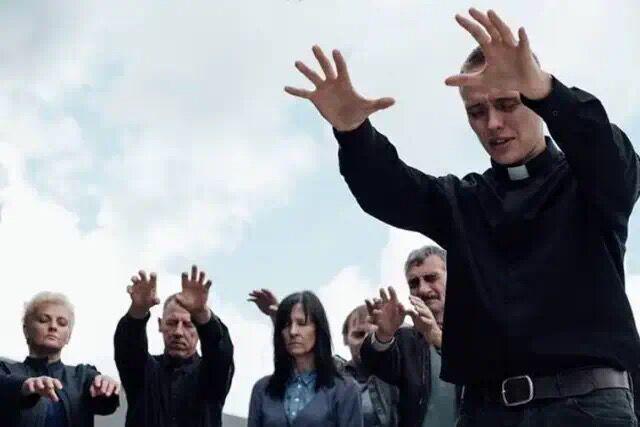The Polish film Corpus Christi, which received an Oscar nomination in the best foreign film category, did not win an academy award like Parasite, but it was no less wonderful and is even more profound than the latter. I think from the perspective of the depth of thought and the complexity of society reflected in these films, the nearly plain-narration style of Corpus Christi is better.
What does it mean to be saved? Is it once and for all freedom from sin, or a necessary continuous struggle against sin in the world? Is salvation a transient status within the walls of a church, or a life-long status? Is the effectiveness of salvation from God or from a religious system? Is the Church an ivory tower or a microcosm of society?
The film explores not only issues of faith but also those of religion. Viewing religion as a node in society, the film explores the complexity of society and human nature and presents a microcosm of the country of Poland.
A young priest comes to an ordinary Polish town. By coincidence, the original priest must leave town for treatment due to his illness. The self-proclaimed young graduate priest of a seminary in Warsaw takes his place. The young priest presides over Mass, breaking the rigidity and dreariness of the traditional ceremony by advocating breathing freely during mass, freely experiencing God, and freely communicating with God. His youthful enthusiasm and his approach to ritualistic reform are totally refreshing. Soon everyone accepts and likes the young priest.
Viewers of the film may be happy with the reform brought by the new priest up to this point, but the hidden truth also appears at the beginning of the film.
This young priest is a fraud! Yes, as a juvenile he spent time in a detention center for offences like fighting, drug abuse and illegal sex - he did it all. At first he was sentenced to work in a lumber factory near the town for his misdeeds, but he did not go to the factory. Instead he came to the town as a fake priest.
Right before the mass and hearing confession, he searches on his phone for how to carry out the religious ceremonies. Then he immediately puts into practice what he learns while his memory is still fresh. He also imitates what he learned from the priest in his juvenile detention center. The mass he prepares is a bit less organised but his passion and simplicity are in sharp contrast to the past cumbersome ceremony to which people are accustomed.
What does it matter if the priest is a fake? Is religion itself not a hoax? A mother, who is distressed by her son's smoking habit, pretends during confession to be a pure mother who does not smoke herself. Yet her pretense is spotted by Daniel, the fake priest. Those who cry out for forgiveness cannot let the driver of a car who caused a terrible accident rest in peace even though he is no longer alive. Doesn't religion provide a beautiful outlook on life?
Daniel begins to seriously work as a priest because he believes what the priest of his detention center tells him, that "Each of us is a priest of God". The priest's remark is ironic because of the contradiction between "each of us" and the religious system, because the priests seen in each of us all are also the ones that must be recognized by the religious system.
Daniel does not cheat and take advantage of his priest identity by leading a debauched lifestyle--he takes the position seriously. He raises money for disabled children and mingles well with young people. The cards of gratitude he receives show how seriously Daniel treats his faith.
When Daniel first comes to the town, it is immersed in sadness. One of its citizens crashed his car into another car carrying six young people from the same small town, killing all seven of them. All the citizens agree that the driver who caused the accident was a murderer, and they refused to bury him in the church cemetery. This decision was supported and implemented by the original priest. The prejudice against the family of this "seventh man" kept them from attending Mass. It is as if they were the outcast sinners described in Jewish society.
Fake Priest Daniel feels that God forgives and loves all, so the seven persons who died in this accident was each innocent and suffered pain. Each soul should be accepted by God. There are no sinners in Daniel's eyes but only people created by God.
But it is not easy to break the former priest's decision and get everyone to accept a proper funeral for the "seventh man" who caused the accident. In the negotiation process all the parties are so involved that the young priest's house and his beloved motorcycle are set on fire. In the trial and conviction of the "seventh man", religious and secular powers are involved. Breaking the verdict does not only involve conflict with the former priest, but also facing pressure from the mayor.
What's worse is Daniel's fake priesthood is under threat because of the appearance of his fellow inmates. However, he insists on working with all the parties involved, and in the end, the "seventh man" is accepted and a funeral is held for him. This may not be because of religious forgiveness, but because of the touch brought by the false priest Daniel, who persisted and struggled for what he thought was right.
In the campaign for the "seventh man's" proper funeral, viewers experience the town's repressed religious system, its mayor's authoritarianism, and the dreary paternalism, all of which tell the story of the state of contemporary Polish society. The youth have little hope and are forced struggle against tradition and power or they may eventually escape it all by either agreeing with the status quo or by living in depression.
In the end, the priest in Daniel's detention center learns of the fake priest. He angrily rushes to the town to drive Daniel away because in his view, the purity and majesty of the religious system needs to be upheld. He wants to stop this criminal's offense to his religion, but what Daniel does is completely neglected. Eventually Daniel leaves, and like Jesus crucified he strips himself naked at the church's altar and leaves the town in full view of everyone, returning to the detention center. In fact, what difference is there between the town and his juvenile prison, since everyone is living in repressed cages?
Between God and the religious system, which one provides true salvation? Sometimes we may encounter a similar issue: if a pastor is removed from his position because of adultery, would the baptisms he performed still be spiritually valid? A fake priest, who was formerly a criminal, performing baptisms--are these baptisms still valid? Is it a blessing and pleasing to God for a man who has not been baptized to perform kindness, even if it is not done in the name of Christianity?
Between religion and faith, is our Christian identity given by God or a religious system; do we pursue God's justice or the goals set for us by a religious system? The film does not give us the answer as it just condenses and illustrates the issues into a product.
The answer may be in our hands.
- Translated by Charlie Li












